


Author: Fagan Abbasov, Researcher, Master at Georgian Institute of Public Affairs
The Equal and full participation of citizens in the process of building a democratic state is of crucial importance. Even so, civil and political integration of ethnic minorities living in Georgia remains a challenge. In the context of the political involvement of ethnic minorities, it is no less interesting to study their electoral behavior.
Non-dominant ethnic groups make up a significant part of the population of Georgia. According to the general census conducted in 2014, 13.2% of the population (excluding the occupied territories of Abkhazia and Tskhinvali) consider themselves ethnic minorities. Among them, the most numerous are the Azerbaijani (6.3%) and Armenian (4.5%) communities (National Statistics Service, 2016). The multi-ethnic and multicultural diversity of the country is less evident when it comes to their involvement in political life.
False narratives are often spread in society regarding the political and electoral behavior of ethnic minorities living in Georgia. In many cases, instead of studying the political involvement of ethnic minorities and the determining factors of their electoral behavior, a significant part of society, as well as political parties, believe that they always support the ruling parties and that this trend does not change. As a result of such stereotypes, parties show little interest in ethnic minorities. In many cases, the vast majority of them do not focus on the above-mentioned group of citizens in their election programs and do not even give preference to their representatives in proportional lists during elections. It can be said that as a result, tens of thousands of potential supporters are neglected.
From the restoration of independence to the present, problems related to the quality of elections and manipulation of voters and election systems in Georgia have persisted for decades. Since the 90s, ruling parties have always had administrative and material resources that allowed for the opportunities to influence the behavior of voters. Electoral behavior of voters is the subject of study of electoral geography, one of the important disciplines of political geography. There are very few existing works on the electoral behavior of voters in Georgia.
Moreover, there are no in-depth academic works on the electoral behavior of ethnic minorities.
The main goal of the present work is to analyze the existing barriers to political participation and electoral behavior of large ethnic groups of Georgia – Azerbaijani and Armenian communities.
The following tasks were defined to achieve the main goal:
- Analysis of secondary data [results of the elections held by the Election Administration in 2008-2021];
- Exploring the main characteristics of the electoral behavior of the Azerbaijani and Armenian communities through a qualitative study (focus groups and in-depth interviews).
Within the framework of the research, 3 focus groups were held with representatives of two large groups of ethnic minorities - the Azerbaijani and Armenian communities. 18 active civil society members in ethnic minority communities were selected for the discussion. Their age category was between 25 and 40. Discussions lasted approximately 1 hour and 20 minutes. An in-depth interview was also conducted with 5 experts working on the issues of ethnic minorities.
To study the political engagement challenges and electoral behavior of ethnic minorities, the study discussed the parliamentary elections of 2008, 2012, 2016, and 2020; presidential elections of 2008, 2013, and 2018; and municipal body elections of 2010, 2014, 2017, and 2021.
In the 2010 local self-government elections, 17 electoral subjects participated throughout Georgia. The then ruling party "United National Movement" traditionally enjoyed a significant advantage in the regions densely populated by ethnic minorities. All of the 43 representatives elected from administrative units inhabited by ethnic Azerbaijanis of Kvemo Kartli, Samtskhe-Javakheti, and Kakheti, and 52 out of 54 representatives elected from administrative units inhabited by ethnic Armenians belonged to the ruling team (Election Administration of Georgia, 2010). In the regions densely populated by ethnic minorities, the elections took place in a non-competitive environment, and in the vast majority of districts, the candidates of the ruling party won an average of 80-90% of the votes.
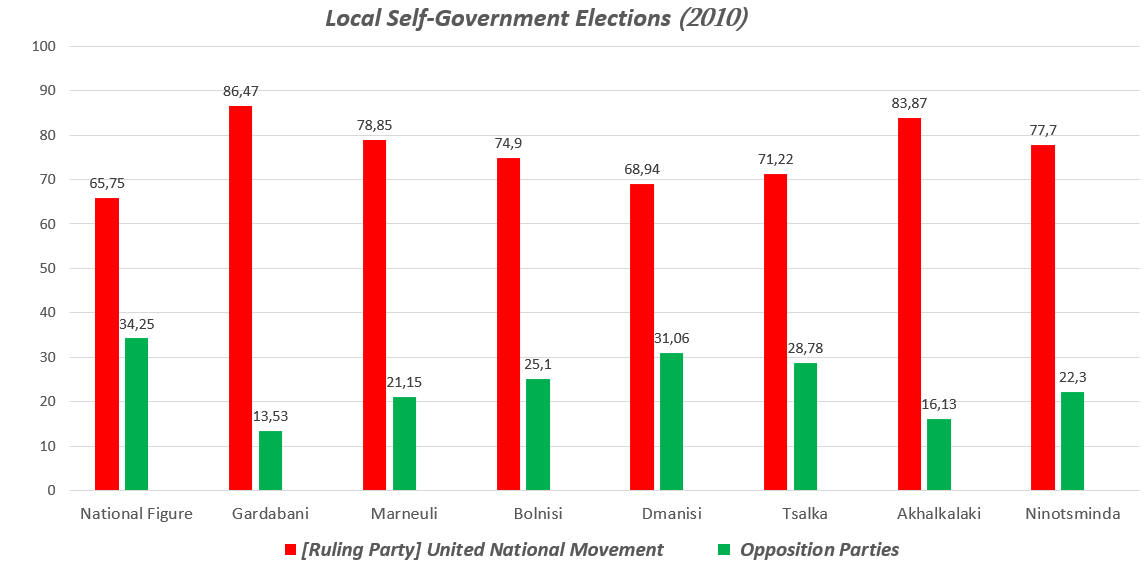
[The graph was prepared based on the data of the Election Administration]
As a result of the elections, The ruling party won an average of 77.4% of the votes in 7 constituencies densely populated by non-dominant ethnic groups in the elections.
In 2014, as compared to 2010, following the change in government, the local self-government elections were held in a relatively more competitive environment in regions densely populated by ethnic minorities. 20 political parties and 4 electoral blocks participated in the elections.
26 mayoral candidates were registered in 6 municipalities of Kvemo Kartli. Among them, only 4 were ethnic Azerbaijanis, with three running in Marneuli and one in Gardabani. The ruling party "Georgian Dream" did not name a representative of the Azerbaijani community as a mayoral candidate in any district. As for the municipalities of the Samtskhe-Javakheti region, 5 of the 21 candidates for mayor were ethnically Armenian, running in Akhalkalaki and Ninotsminda electoral districts.
It is also interesting to note that as a result of the 2014 elections, independent candidates or opposition members won in 13 administrative units of regions populated by ethnic minorities (Election Administration of Georgia, 2014).
.png)
[The graph was prepared based on the data of the Election Administration]
The pre-election period in the Marneuli electoral district was run in a more lively and, to some extent, tense environment. A significant part of the local population criticized the ruling party's decision regarding the mayoral candidate. In their opinion, the ruling party did not want to find a local candidate and instead nominated a candidate from Tbilisi for the post of mayor of Marneuli. The main argument of the residents was that the mayor should be local and should have an understanding of the problems and needs of the municipality.
On June 12, the "Georgian Dream" political council issued a statement and advised the candidate of the coalition in Marneuli, Merab Topchishvili, to withdraw his candidacy in favor of one of the two ethnic Azerbaijani opposition candidates (Statement of the political council of the coalition "Georgian Dream", 2014). The main reason behind the decision was the disagreement expressed by a significant part of the local population regarding the candidate of the ruling party. Nevertheless, the candidate of the ruling party, Merab Topchishvili, refused to withdraw his candidacy, stating that he would run for office (Interpressnews.ge, 2014). Akmamed Imamkuliyev, the candidate of the United National Movement, ruled out the risk of conflict on ethnic grounds in Marneuli and stated that he would achieve victory (IPN, 2014).
Following the elections held in a tense environment, the Election Administration announced the candidate of the ruling party, Merab Topchishvili, as the winner. He received 51.08% of the votes, one of the lowest shares seen among the mayoral candidates of "Georgian Dream" across the country. As for proportional elections, "Georgian Dream" managed to collect only 52.42% of votes in Marneuli district. "Georgian Dream" mayoral candidates also won in the remaining electoral districts densely populated by ethnic minorities.
As a result of the elections, "Georgian Dream" received an average of 60.71% of votes in 7 electoral districts densely populated by non-dominant ethnic groups, which is 16.7% lower than the results achieved by the previous ruling party in 2010. As compared to 2010, the votes of opposition parties in the above-mentioned 7 constituencies increased from 22.6% to 39.29%. 5 parties in Akhalkalaki, 4 in Ninotsminda, and 3 parties each in Gardabani, Tsalka, Dmanisi, Marneuli, and Bolnisi won mandates in municipal assemblies according to the proportional voting rules.
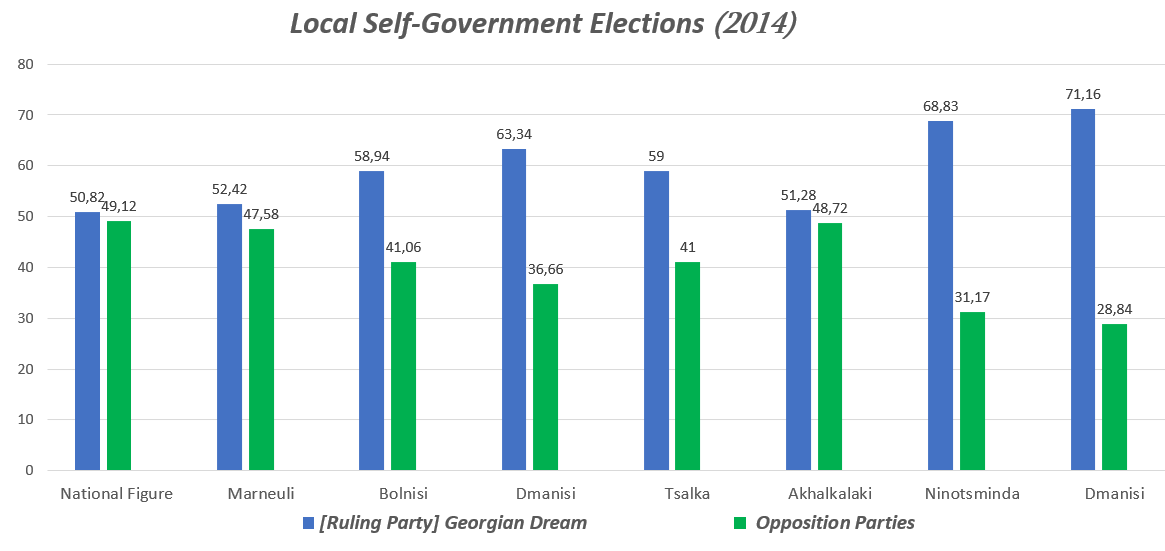
[The graph was prepared based on the data of the Election Administration]
"United National Movement" came second proportionally in Marneuli, Ninotsminda, Dmanisi, and Gardabani constituencies, "Nino Burjanadze - United Opposition" came second in Tsalki and Bolnisi constituencies, and "Non-parliamentary opposition (Kakha Kukava, Pikria Chikhradze)" came second in Akhalkalaki.
22 political parties and 5 electoral blocs took part in the 2017 local self-government elections. Representatives of ethnic minorities constituted 38.4% of the candidates for the majority of the municipal assembly in Kvemo Kartli, 35.7% in Samtskhe-Javakheti, and 4.8% in Kakheti. As for mayoral candidates, 7 out of 27 candidates in the Kvemo Kartli region and 10 out of 31 in the Samtskhe-Javakheti region came from non-dominant ethnic groups. They ran for office in Marneuli, Gardabani, Akhalkalaki, and Ninotsminda.
Mayoral candidates of "Georgian Dream" won the elections in the Kvemo Kartli and Samtskhe-Javakheti constituencies. Unlike the 2014 local government elections, the chances of victory by opposition parties or independent candidates at the level of administrative units were quite low. It can be said that the influence of the ruling party was stronger compared to 2014.
Only two representatives from the opposition parties won in the Kvemo Kartli and Samtskhe-Javakheti administrative units. As for the proportional distribution of votes, the ruling party gathered an average of 71.8% of the votes in 7 municipalities densely populated by ethnic minorities.
The representation of ethnic minorities in proportional party lists has traditionally been weak. Except for the Akhalkalaki and Ninotsminda constituencies, the ruling party "Georgian Dream" did not give priority to representatives of ethnic minorities for the first three spots of the party lists in Marneuli, Bolnisi, Dmanisi, Gardabani, and Tsalka. As a result of the elections, 5 parties were represented in Tsalka, 4 each in Gardaban and Akhalkalaki, 3 each in Marneuli, Dmanisi, and Ninotsminda, and 2 in Bolnisi. Representatives of non-dominant ethnic groups were in the majority in municipal assemblies in Akhalkalaki, Ninotsminda, and Marneuli municipalities (Election Administration of Georgia, 2017).
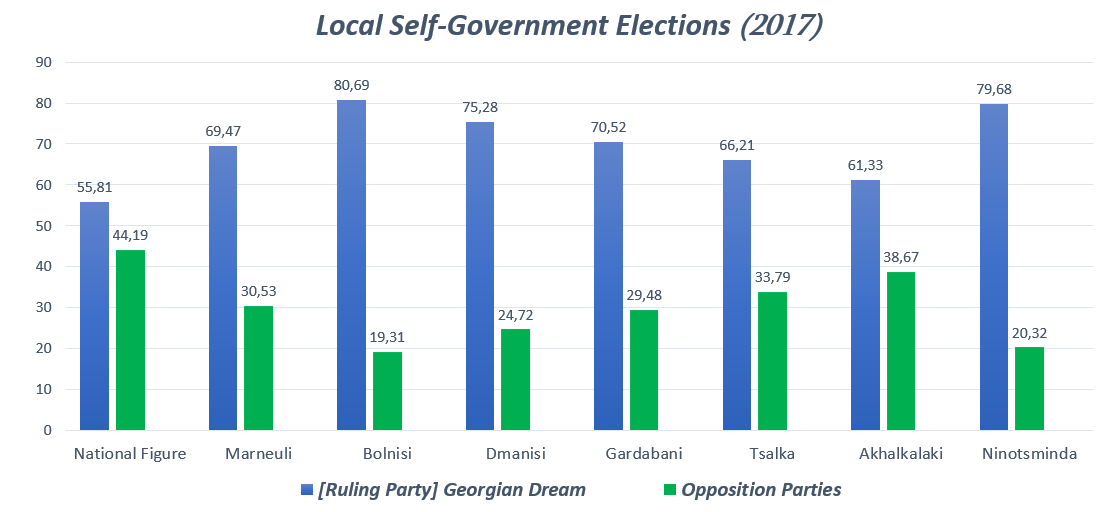
[The graph was prepared based on the data of the Election Administration]
111 election subjects participated in the 2021 municipal body elections, including 43 parties and 68 voter initiative groups. 3 out of 17 mayoral candidates in the Kvemo Kartli municipality were ethnically Azerbaijani, and 6 out of 18 in Samtskhe-Javakheti were of Armenian origin. Traditionally, political parties gave preference to representatives of ethnic minorities only in Akhalkalaki, Ninotsminda, and Marneuli constituencies. Among these, each municipality had 3 registered candidates each. Similar to the 2017 local self-government elections, in 2021 the mayoral candidates of "Georgian Dream" won in all three constituencies. As a result of the elections, 65 representatives of the Azerbaijani or Armenian communities were elected to the municipal assemblies from Kvemo Kartli, Samtskhe-Javakheti, and Kakheti regions, including 6 representatives from the opposition and 1 independent candidate.
5 parties won the mandate in the Tsalka municipal assembly, 4 each in Akhalkalaki and Ninotsminda, 3 each in Dmanisi and Gardabani, and 2 each in Marneuli and Bolnisi. The representation of ethnic minorities in the proportional party lists was quantitatively more protected in Akhalkalaki and Ninotsminda municipalities than in the Kvemo Kartli region. As for the representation at the municipal assembly level, representatives of the Armenian community were again in the majority in Akhalkalaki and Ninotsminda, while Azerbaijanis were in the majority in the Marneuli municipal assembly. A mayor representing an ethnic minority was elected in all three municipalities (Election Administration of Georgia, 2021). In municipalities other than Akhalkalaki, Ninotsminda, and Marneuli, the representation of ethnic minorities in high political positions was quite low.
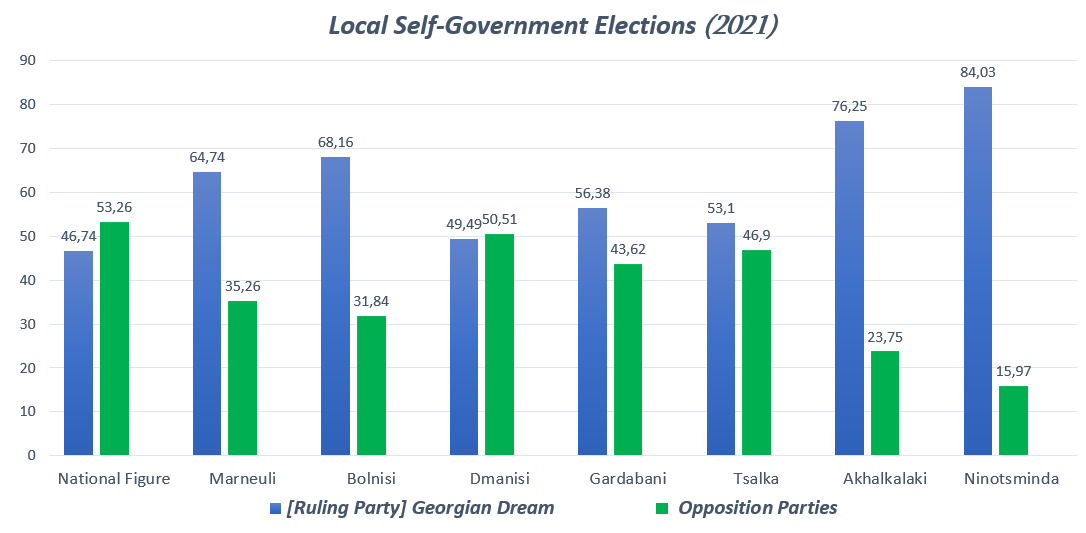
[The graph was prepared based on the data of the Election Administration]
As a result of the elections, the ruling party won 64.6% of the votes in 7 constituencies densely populated by ethnic minorities, 7.2% lower than the result seen in 2017.
In the recent history of the country, the presidential elections of January 5, 2008, were notable due to their highly polarized environment. The tension was felt especially in the capital and other large cities.
The grounds for holding the elections were the events of November 2007, when the protests in Tbilisi were disbanded by forceful methods. The then president, Mikheil Saakashvili, initiated snap presidential elections, stating that he needed a new mandate from the people against the background of the ongoing tensions in the country (Civil.ge, 2008).
7 candidates (Mikheil Saakashvili, Levan Gachechiladze, Arkadi Patarkatsishvili, Shalva Natelashvili, Davit Gamkrelidze, Giorgi Maisashvili, Irina Sarishvili-Chanturia) fought for the post of president in the special elections. As a result of the elections, the candidate of the ruling party, Mikheil Saakashvili, accrued 53.47% of the votes (Election Administration of Georgia, 2008). Support for the candidate of the ruling party was most noticeable in constituencies densely populated by ethnic minorities.
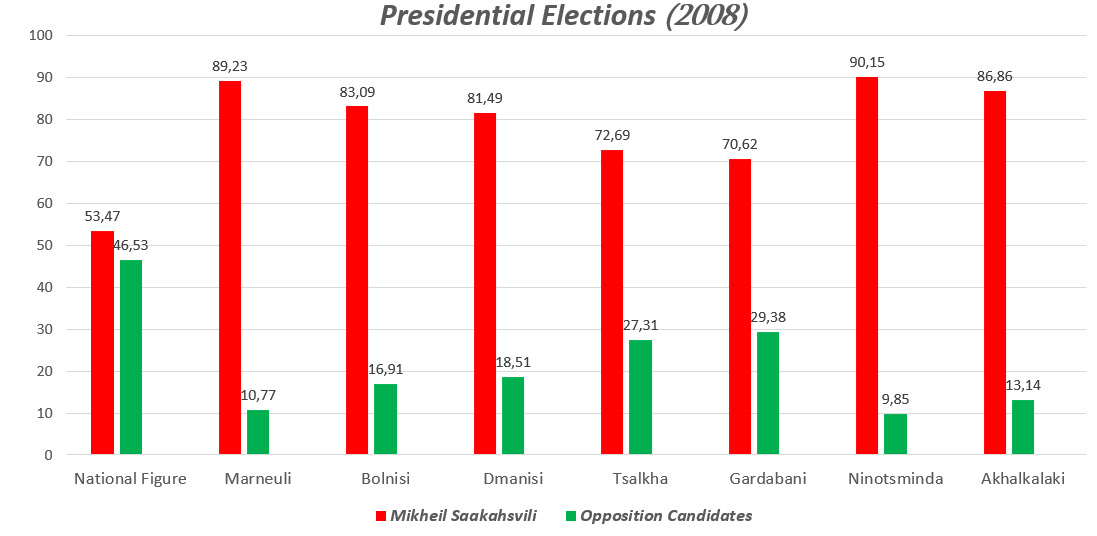
[The graph was prepared based on the data of the Election Administration]
Mikheil Saakashvili received an average of 82.02% of the votes in 7 constituencies densely populated by ethnic minorities, 28.55% ahead of the national figure, while the total percentage of votes received by the opposition candidates in the same constituencies was almost 2.5 times lower than the results seen at the national level.
The elections of October 27, 2013, were the first presidential elections held after the change of government and the transition to the parliamentary governance model. According to the Election Administration of Georgia, 23 candidates participated in the presidential elections (Election Administration of Georgia, 2013). Among them, the main opponents were Giorgi Margvelashvili from the "Georgian Dream" coalition, Davit Bakradze from the "United National Movement", and Nino Burjanadze, the candidate of "Democratic Movement - United Georgia". As a result of the elections, Giorgi Margvelashvili won with 62.12% of the votes. It is interesting to note that, unlike the 2008 presidential elections, support for the candidate of the ruling party in regions densely populated by ethnic minorities did not differ as much (only 1.08% higher) from the national figure (Election Administration of Georgia, 2013).
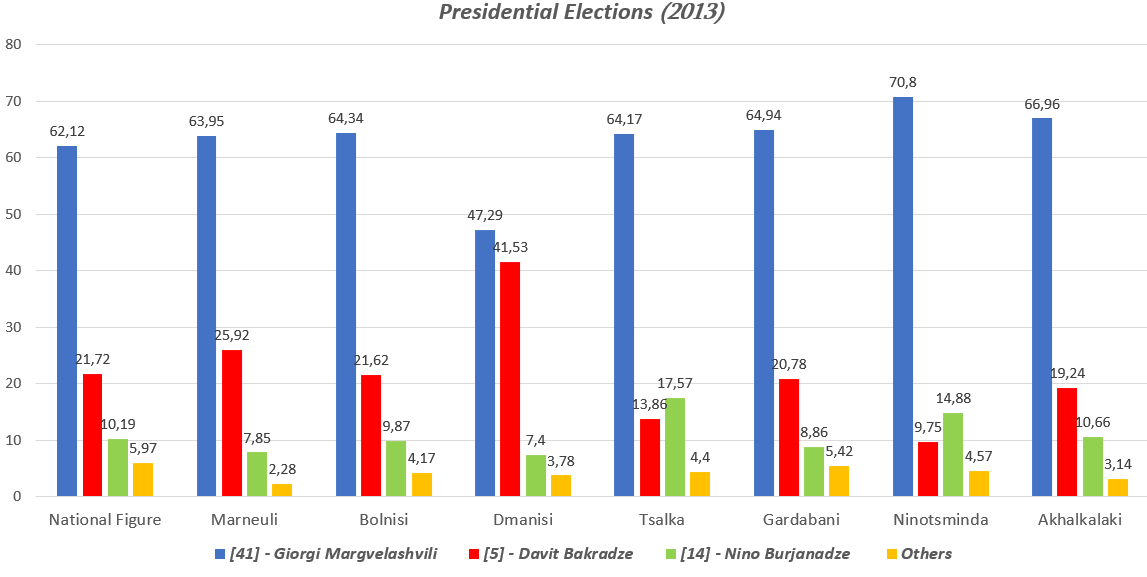
[The graph was prepared based on the data of the Election Administration]
The presidential elections held on October 28, 2018, were the last instance of citizens directly electing the president. 25 candidates competed for the post of president (Election Administration of Georgia, 2018). The ruling party "Georgian Dream" did not put forth a candidate and supported the independent candidate Salome Zurabishvili (On.ge, 2018). The main opponent of the latter was Grigol Vashadze from the United National Movement. As a result of the first round, none of the candidates could cross the 50%+1 threshold, and a second round was held between Salome Zurabishvili and Grigol Vashadze.
It should be noted that despite the support of the ruling party in the first round of the elections, Salome Zurabishvili won more votes than her opponents in only four of the seven electoral districts densely populated by ethnic minorities. With the support of the ruling party, Salome Zurabishvili won with 59.52% in the second round (Election Administration of Georgia, 2018).
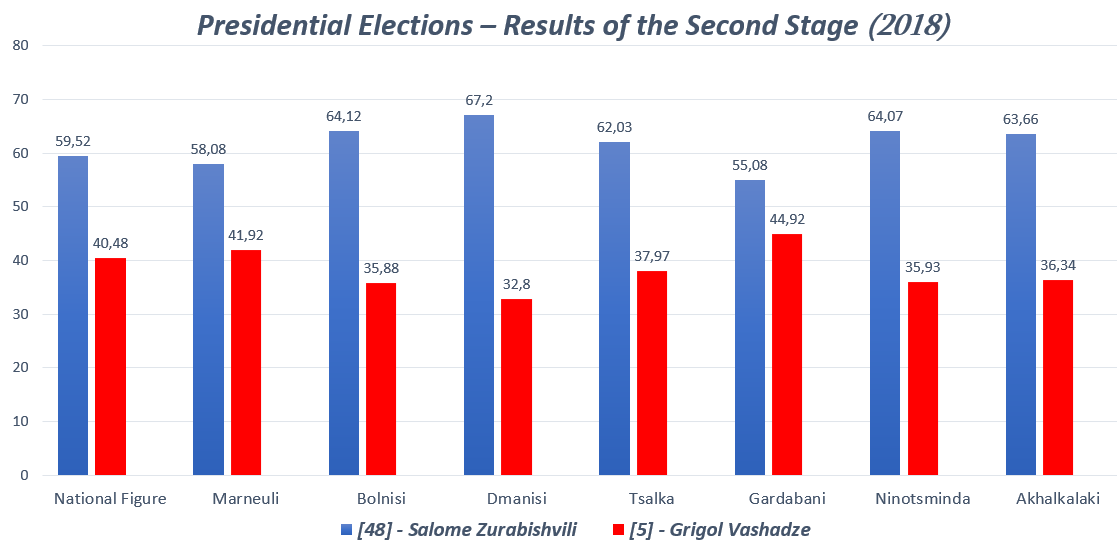
[The graph was prepared based on the data of the Election Administration]
Similar to the 2013 parliamentary elections, the 2018 elections did not show a significant difference between the electoral behavior of ethnic minorities and the majority. Salome Zurabishvili received an average of 62.03% of the votes in 7 electoral districts densely populated by ethnic minorities, only 2.51% higher than the national figure. In addition, Salome Zurabishvili received a lower-than-average percentage of votes in Marneuli and Gardabani constituencies (Election Administration of Georgia, 2018).
12 political parties took part in the 2008 parliamentary elections. Of the 1,767 candidates on the party lists, only 40 were representatives of the Azerbaijani or Armenian communities (2.26% of the pool of candidates). Considering the spots allocated to them in the proportional party lists, they had a rather low chance of getting into the legislature. As for representatives, out of 434 candidates nationwide, only 15 hailed from ethnic minorities. As a result of the elections, four parties [United National Movement, United Opposition (National Council, right-wing parties), Giorgi Targamadze: Christian-Democrats, Shalva Natelashvili - Labor Party of Georgia] won the mandate. 6 candidates from ethnic minorities (from the ruling party) were elected to the legislative body, including three from the proportional lists and three from the majoritarian constituencies (Marneuli, Akhalkalaki, Ninotsminda). The influence of the then ruling party, the "United National Movement", was noticeable in the regions populated by ethnic minorities, and the elections were generally held without competition. While the ruling party won 59.18% of the votes across the country, this figure was 83.22% on average in municipalities densely populated by ethnic minorities (Electoral Administration of Georgia, 2008).
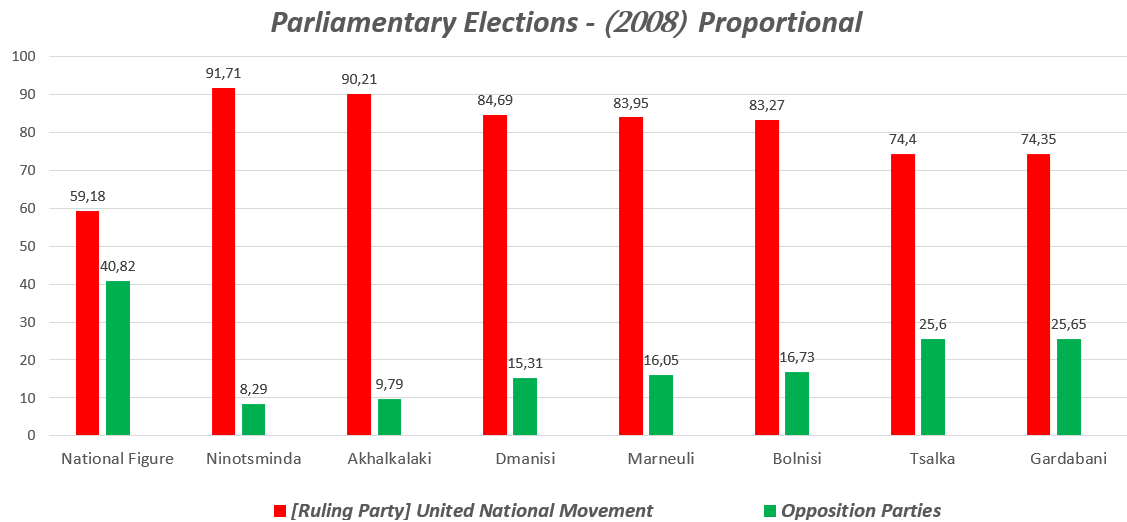
[The graph was prepared based on the data of the Election Administration]
After the restoration of Georgia's state independence, power was transferred through an election for the first time in 2012. 16 political parties/electoral blocs participated in the parliamentary elections. Like the parliament of the seventh convocation, the representation of ethnic minorities in the parliament of the eighth convocation of 2012-2016 comprised 6 people. Among them, four were elected from the "United National Movement" [one proportional list, three majoritarian], and two from the proportional list of the "Georgian Dream". Among the parties with a mandate in the Parliament of the eighth convocation, in the 200-person proportional list of "Georgian Dream", 8 were ethnically Azerbaijani or Armenian [among these, the best position in the list was at 36], while in the 155-person list of "United National Movement", 12 candidates were ethnically Azerbaijani or Armenian, with the candidate in the best position in the 39th spot.
The ruling party gave preference to candidates representing ethnic minorities in Akhalkalaki, Ninotsminda, and Marneuli constituencies. As for the "Georgian Dream", in addition to the three municipalities mentioned above, Tsalka also had a candidate representing an ethnic minority. As a result of the elections, "Georgian Dream" won 54.97% of the votes, while "United National Movement" accrued only 40.34% of the votes. Despite the defeat in large cities and various regions of the country, the "United National Movement" won an average of 71% of the votes in municipalities densely populated by ethnic minorities (Marneuli, Bolnisi, Dmanisi, Gardabani, Tsalka, Akhalkalaki, Ninotsminda) (Election Administration of Georgia, 2012).
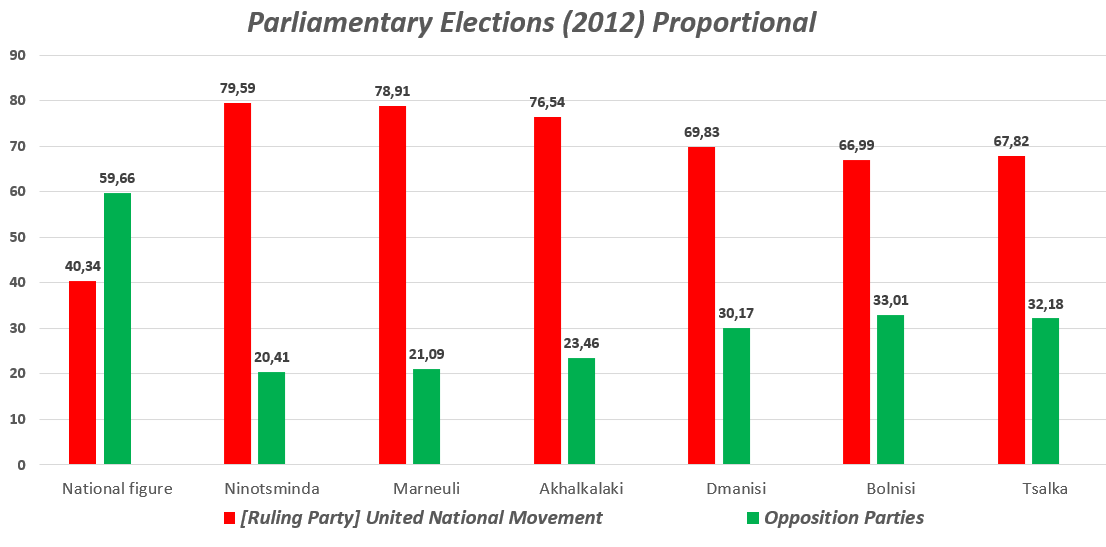
[The graph was prepared based on the data of the Election Administration]
19 parties and 6 blocs were registered for the 2016 parliamentary elections. Out of 150 members of the Parliament, 77 MPs were elected by the proportional list, and 73 by the majority rule. As a result of the 2016 parliamentary elections, representatives of ethnic minorities won 11 seats in the legislative body. Among them, four were ethnically Azerbaijani, and three were ethnically Armenian. It can be said that the involvement of ethnic minorities was relatively high in the elections of the legislative body in 2016. 29 of the 53 candidates registered in #31 Gardabani, #33 Bolnisi, #34 Dmanisi/Tsalka, #35 and #36 Marneuli, #46 Akhalkalaki/Ninotsminda electoral districts were representatives of ethnic minorities. In the Kakheti region, the only ethnically Azerbaijani candidate was running in the #23 majority district of Sagarejo. They were also an independent candidate in the 2014 local self-government elections and won the mandate in the municipal assembly.
The ruling party "Georgian Dream" had candidates representing ethnic minorities in #31 Gardabani, #35 Marneuli, and #46 Ninotsminda/Akhalkalaki constituencies. As for the main opposition party, "United National Movement", in addition to the constituencies mentioned above, #36 Marneuli and #33 Bolnisi electoral districts also gave preference to ethically Azerbaijani candidates. In almost all constituencies densely populated by ethnic minorities, the fight was between the candidates of the ruling party and the main opposition party.
As a result of the elections, the majoritarian of "Georgian Dream" won in #34 Dmanisi/Tsalka District with 66.17%, in #46 Akhalkalaki/Ninotsminda District with 63.71%, and in #35 Marneuli District with 56.31%. Candidates of the ruling party received only 52.12% of the votes in #33 Bolnisi and 50.02% in Gardabani. In the #36 Marneuli majority district, the "UNM" candidate took 47.91% of the votes, while the "Georgian Dream" candidate Tamaz Naverian took 43.41%. In the second round of the elections held against the backdrop of a tense electoral environment, the candidate of the ruling party won up to 3/4 of the votes, according to the Election Administration.
For the first time, in the regions densely populated by ethnic minorities, in the majoritarian constituencies of #36 Marneuli and #33 Bolnisi, the opposition parties proportionally won more votes than the ruling party. In the majoritarian constituencies where ethnic minorities make up more than half of the population [#31 Gardabani, #33 Bolnisi, #34 Dmanisi/Tsalka, 35# Marneuli, #36 Marneuli, 46 Akhalkalaki/Ninotsminda], the average number of votes received by the ruling party in the parliamentary elections decreased by 30.24% as compared to the results achieved by the previous ruling party [United National Movement] in 2018.
As a result of the elections, two ethnic Armenians and one Azerbaijani were elected by the proportional list of "Georgian Dream", 2 ethnic Azerbaijanis and 1 Armenian were elected by majority rule. As for the opposition, one representative of the Azerbaijani community was elected to the legislative body from the proportional list of the "United National Movement" (Election Administration of Georgia, 2016).
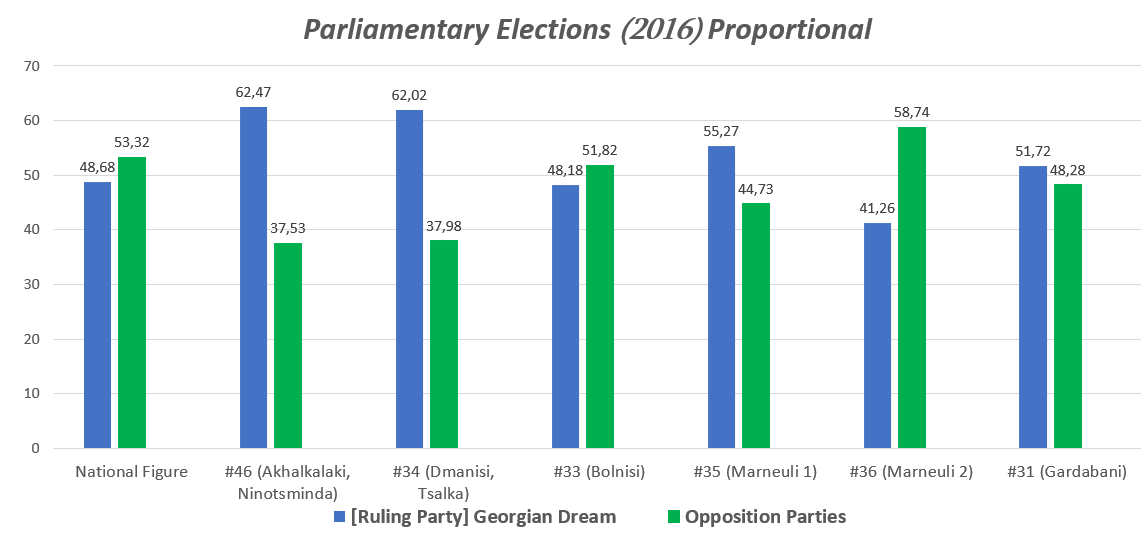
[The graph was prepared based on the data of the Election Administration]
In the parliamentary elections of 2020, the number of majoritarian constituencies was reduced from 73 to 30, and 120 MPs were elected to the legislative body under the proportional system. 48 political parties and 2 electoral blocs took part in the elections. 490 majoritarian candidates were registered across the country, including 16 representatives of ethnic minorities from the Kvemo Kartli and Samtskhe-Javakheti regions (9 candidates of ethnic Azerbaijani and 7 candidates of Armenian origin).
As a result of the elections, 9 political parties won mandates in the legislative body. Analysis of their proportional lists shows that ethnic Azerbaijanis and Armenians were underrepresented. Only 33 of the 1,335 candidates on the proportional lists of the 9 political parties with seats in the 10th convocation parliament were ethnically Azerbaijani or Armenian [identified according to first and last names]. In the proportional lists of the above-mentioned political parties, the following were the highest spots occupied by representatives of ethnic minorities: "Alliance of Patriots" (14th), "United National Movement" (17th), "Labor Party" (19th), "Strategy Agmashenebeli" " (25th), "Lelo" (26th), "European Georgia" (28th), "Georgian Dream" (35th). There were no representatives of ethnic minorities in the proportional lists of "Girchi" and "Citizens".
During the 2020 parliamentary elections, the settlements densely populated by ethnic minorities were part of the following majoritarian constituencies: #13 (Marneuli/Gardabani), #14 (Bolnisi/Dmanisi/Tsalka/Tetritskaro), #18 (Akhalkalaki/Ninotsminda). 17 of the 36 candidates registered in the #13, #14, and #18 majoritarian constituencies were representatives of ethnic minorities (from #13 and #18 constituencies). None of the 13 electoral subjects was a representative of an ethnic minority in the #14 majoritarian district (Bolnisi/Dmanisi/Tsakla/Tetritskaro). As a result of the elections, "Georgian Dream" candidates received more than half of the votes in all three majoritarian constituencies.
In the last parliamentary elections, Georgian Dream received 66.77% of the votes in the #18 electoral district (Akhalkalaki-Ninotsminda) and 56.95% in the #14 electoral district (Bolnisi, Dmanisi, Tsalka, Tetritskaro). As in 2016, the ruling party won fewer votes than the opposition (49.57%) in Marneuli and Gardabani (#13 majoritarian district). In total, "Georgian Dream" proportionally collected 57.76% of the votes in the above-mentioned 3 majoritarian constituencies.
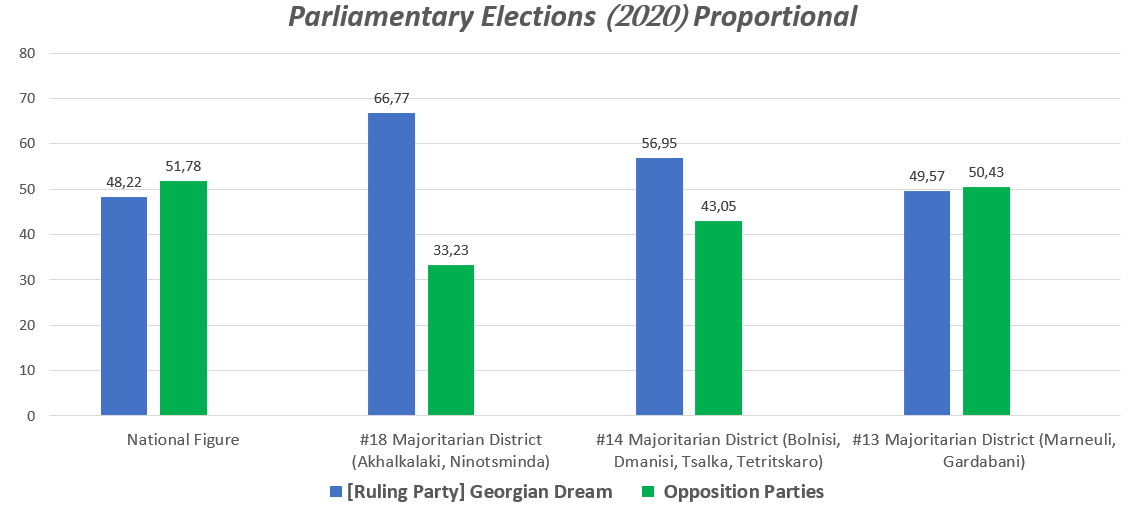
[The graph was prepared based on the data of the Election Administration]
"European Georgia" took second place in the #18 majoritarian district with 8.45% support. In the case of majoritarian constituencies #13 and #14, "United National Movement" took second place with 38.42% and 31.23% of the votes, respectively (Election Administration, 2020).
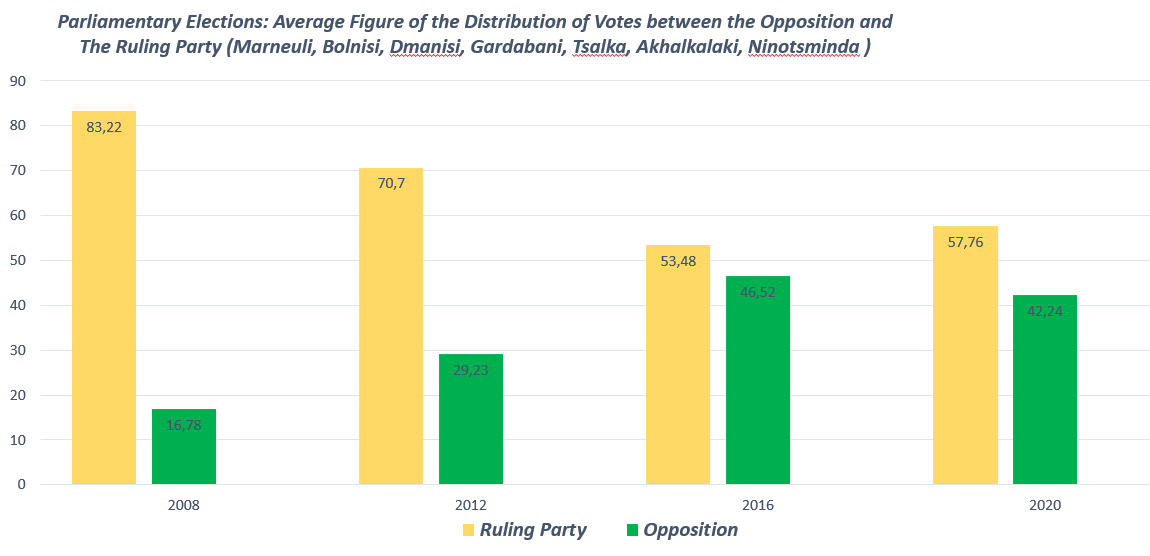
[The graph was prepared based on the data of the Election Administration]
Focus group participants and experts agree that the political involvement of ethnic minorities in Georgia remains a significant challenge. According to the experts participating in the study, it would be possible to ensure equal political participation for all groups over the years by strengthening the quality of democracy, although this has not been achieved so far. In such a situation, it is important to work on additional mechanisms that may facilitate the political involvement of ethnic minorities.
The study participants agree that political will is extremely important in achieving equal and full-fledged political participation of ethnic minorities. After independence, the state did not devise any mechanism to ensure the political participation of non-dominant ethnic groups. In order to promote civil equality and integration, the strategies implemented from 2009 to date provided for the strengthening of legislative mechanisms, including additional financial benefits for political parties in the event of an increase in the number of representatives of ethnic minorities in party lists. However, effective steps in this direction still have not been taken.
Most of the study participants believe that for Georgia, as a transitional country, one of the main challenges results from the heavy legacy of the Soviet Union, namely the absent boundary between the state and the ruling party. This problem is observed more acutely in regions densely populated by ethnic minorities. The absence of a boundary between the state and the ruling party and perception of the political involvement of ethnic minorities from the prism of security was always to the advantage of ruling parties, allowing them to mobilize a large number of votes with few resources. All of this is the result of long-standing systemic challenges. In general, this had and continues to have a great influence on the political involvement of ethnic minorities, as well as on their electoral behavior.
With regard to the full civil and political involvement of non-dominant ethnic minorities living in Georgia, in the absence of a legislative mechanism, their political engagement largely depends on political parties. Focus group participants and experts draw attention to the weak relationships between political parties and ethnic minority voters. The representation of non-dominant ethnic groups is very low in the decision-making process at the intra-party level. The vast majority of parties do not have ethnic minority representatives in their political councils. Political parties devote very little of their resources to regions densely populated by ethnic minorities. Apart from the ruling party and the main opposition party, the rest of the political groups generally have no party infrastructure and permanent offices in regions densely populated by ethnic minorities. Their problems and needs are not reflected in the proposed policies of political parties. The websites of the parties and the news they publish are not accessible to the vast majority of ethnic minorities who do not speak the state language.
A large part of the participants of the focus group believe that as the elections approach, it leads to an increase in tension in the regions densely populated by ethnic minorities. They recall incidents from the past and state that any pressure and control over the candidates, as well as the will of the voters, has a rather negative effect on their electoral behavior. During the study, participants brought attention to incidents such as the arrest of the independent candidate elected to the municipal assembly from #18 administrative unit of #11 Sagarejo electoral district, K. Mamedov (likely for political reasons), in 2014; the tense pre-election period in the #36 Marneuli electoral district and the serious confrontations in the #48 Kizilajlo constituency of the same district during the parliamentary elections of 2016 (Civil.ge, 2016); the incident of residents swearing on the Koran in support of the ruling party in the village of Irganchai, Dmanisi municipality during the local government elections of 2017 (Tabula, 2017); cases of removal of candidates from the proportional lists of opposition parties in regions populated by ethnic minorities a few days before the elections; as well as, the news spread regarding the arrest of opposition activists in Dmanisi during the 2021 local government elections and the kidnapping/disappearance of R. Ramazanov, who was elected by majority rule from "UNM" as a result of the elections. Several days later, he denied the abduction, although stating that he was leaving "UNM" (Transparency International - Georgia, 2021). According to the assessment of the study participants, such incidents cause fear among ethnic minorities, weaken their political involvement, and increase mistrust in the elections.
Study participants also drew attention to the fact that alongsides changes in government, influential people involved in politics move from one political party to another and remain decision-makers. Through their influence, they participate in the mobilization of voters, block the appearance of new faces in politics, and thereby influence the electoral behavior of voters.
Respondents also draw attention to the information vacuum created by not knowing the state language, which has contributed to the isolation of ethnic minorities from society for decades. One of the strategic directions in the state strategy implemented since 2009 with the aim of ensuring civil equality and integration for ethnic minorities was the provision of access to media and information. Experts and focus group participants consider the steps taken in this direction to be insufficient. They state that the Public Broadcaster has the obligation to provide quality information to various groups of society, including ethnic minorities. In their opinion, the media policy carried out by the Public Broadcaster does not serve to ensure the availability of information for tens of thousands of representatives of ethnic minorities who do not know the state language. Experts believe that the media policy of the Public Broadcaster is aimed at disseminating information in the languages of ethnic minorities using Internet media (websites, Facebook pages), even though the use of the Internet is low in the regions inhabited by the above-mentioned groups. The participants of the focus groups believe that, in recent years, in the regions of Kvemo Kartli and Samtskhe-Javakheti, internet media in the local Azerbaijani and Armenian languages enjoy popularity, although they are unable to cover the region completely. Television channels are still the main source for the mostly middle-aged and elderly citizens who do not know the state language. In such circumstances, the above-mentioned group cannot receive information about current events in the country, including election processes, which is an obstacle for making an informed choice.
Local youth believe that elections held in recent years show that ethnic minorities want to see their representatives in the process of making political decisions. This trend was more pronounced in the Kvemo-Kartli region. According to the focus group participants, ethnic Armenians are proportionally represented at the level of the local government and the legislative body in the municipalities of Akhalkalaki and Ninotsminda, although this cannot be said about the municipalities of Kvemo Kartli, such as Tsalka, Bolnisi, or Dmanisi. In these specific municipalities, the ruling parties did not give priority to the representatives of ethnic minorities either during the parliamentary elections or during the local self-government elections in the crucial [assembly chairman's or mayor's] positions. The youth recall the parliamentary elections of 2016, when the elections in the #33 Bolnisi (Gogi Meshvelian from "Georgian Dream" and Samira Bairamova from "United National Movement") and the #36 Marneuli constituencies (Tamaz Naverian from "Georgian Dream" and Akmamed Imamkuliev from "United National Movement") took place against a rather tense background. In both districts, in the areas populated by ethnic Azerbaijanis, S. Bairamova and A. Imamkuliyev managed to mobilize a large number of votes.
Some experts state that, since 1990, almost all elections have been held under the dominance of the ruling parties, with their victory rarely questioned, not only in the regions densely populated by ethnic minorities, but throughout the country. The situation has changed since 2008 (and relatively late in the regions densely populated by ethnic minorities, after 2012) and this has been noticeable in the results achieved by the opposition forces in the elections. Some of them also positively evaluated the strengthening of law and order in the regions densely populated by ethnic minorities and the reforms carried out in some directions after the "Rose Revolution", and this also influenced their electoral behavior to a certain extent. In 2008, the ruling party "United National Movement" won an average of 85% of the votes in 7 municipalities densely populated by non-dominant ethnic groups (Marneuli, Bolnisi, Dmanisi, Gardabani, Tsalka, Akhalkalaki, Ninotsminda). The figure decreased to 70.7% in 2012. In 2016, the ruling party "Georgian Dream" managed to mobilize only 53.48% of the votes in the above-mentioned 7 electoral districts, and 57.76% in 2020. Support for the ruling party is more pronounced in the municipalities of Akhalkalaki and Ninotsminda. Focus group participants mostly attribute this to the non-competitive political environment in the peripheral regions. Overall, compared to 2008, in 2020, the number of votes received by opposition parties in the above-mentioned 7 municipalities densely populated by ethnic minorities has almost tripled, from 15% to 42.24%.
The participants of the focus groups agree with the opinion that, following changes in the government, under the conditions of a coalition government and relatively reduced control, the number of representatives of ethnic minorities who actively participated in political processes increased. The local self-government elections of 2014 were a good example, where in 13 administrative units of the Kvemo-Kartli, Kakheti, and Samtskhe-Javakheti regions, an independent or opposition candidate was elected to municipal assemblies. Compared to the 2010 local government elections, support for the ruling party decreased from 77.42% to 60.71%. In addition, in 2016 and 2020, the ruling party was defeated for the first time in several constituencies densely populated by ethnic minorities, and in 2021, exactly half of the Dmanisi municipal assembly was elected from opposition parties.
In conclusion, it can be said that in recent years, the electoral behavior of ethnic minorities has undergone significant changes, and the stereotypes that they are always an "electoral resource" for the ruling parties is no longer true.
Observed trends show that ethnic minority communities are more willing to engage in political participation and decision-making. To this end, political will on the part of the government and strengthening of legislative mechanisms are important. Meanwhile, political parties, which are of crucial importance in terms of political involvement of ethnic minorities, should have a vision for the political recruitment of the above-mentioned groups, should take into account their needs in their election programs, and need to work on possible ways to establish close relationships with them.
1. Final evaluation of the implementation of the State Strategy and Action Plan of Civil Equality and Integration 2015-2020. Tbilisi, 2021. Retrieved from https://smr.gov.ge/uploads/Files/_%E1%83%98%E1%83%9C%E1%83%A2%E1%83%94%E1%83%92%E1%83%A0%E1%83%90%E1%83%AA%E1%83%98%E1%83%90/Civic_Integration-Final_Assessment_GEO1-24.06_(1).pdf
2. National Statistics Office of Georgia. (2016). Official data of the 2014 population census. Retrieved from https://migration.commission.ge/files/census_release_geo_2016.pdf
3. Election Administration of Georgia. (2008). Summary protocol of the results of the special election of the President of Georgia on January 5, 2008. Retrieved from https://cesko.ge/static/res/old/other/6/6773.pdf
4. Election Administration of Georgia. (2008). Summary protocol of the results of the elections of the Parliament of Georgia on May 21, 2008. https://cesko.ge/ge/archevnebi/2008/parlamentis-archevnebi-19-ge/singleview/9005165-saqartvelos-parlamentis-2008-wlis-21-maisis-archevnebis-shedegebis-shemadjamebeli-oqmi-3277
5. Election Administration of Georgia. (2008). Party lists registered for the elections of the Parliament of Georgia on May 21, 2008, and candidates registered in majoritarian constituencies. https://cesko.ge/ge/archevnebi/2008/parlamentis-archevnebi-19-ge/singleview/9003149-saqartvelos-parlamentis-2008-wlis-21-maisis-archevnebisatvis-registrirebuli-partiuli-siebi-da-majoritalur-olqebshi-registrirebuli-kandidatebi-3319
6. Election Administration of Georgia. (2010). May 30, 2010 elections of the representative body of the local self-government - assembly, the self-government body of the capital of Georgia - Tbilisi - the assembly and the mayor of the capital of Georgia - Tbilisi. Retrieved from https://archiveresults.cec.gov.ge/results/2010/major.html
7. Election Administration of Georgia. (2012). Registered party lists. Retrieved from https://cesko.ge/ge/archevnebi/2012/parlamentis-archevnebi-2012-136-ge/saarchevno-subieqtebi-142-ge/singleview/9009745-registrirebuli-partiuli-siebi-7131
8. Election Administration of Georgia (2012) Registered majoritarian candidates. Retrieved from https://cesko.ge/ge/archevnebi/2012/parlamentis-archevnebi-2012-136-ge/saarchevno-subieqtebi-142-ge/singleview/9009763-registrirebuli-majoritari-kandidatebi-7148
9.Election Administration of Georgia. (2012). Data according to constituencies and districts. Retrieved from https://archiveresults.cec.gov.ge/results/2012/index.html
10. Election Administration of Georgia. (2013). Summary minutes of the results of the elections of the President of Georgia on October 27, 2013. Retrieved from https://cesko.ge/ge/archevnebi/2013/prezidentis-archevnebi-2013-217-ge/shemadjamebeli-oqmi
11. Election Administration of Georgia. (2014). Candidates registered in District Election Commissions. https://cesko.ge/ge/archevnebi/2014/tvitmmartvelobis-archevnebi/saarchevno-subieqtebi/singleview/9016888-saolqo-saarchevno-komisiebshi-wardgenili-kandidatebi
12. Election Administration of Georgia. (2014). Data according to constituencies and districts. Retrieved from https://archiveresults.cec.gov.ge/results/2014/index.html
13. Election Administration of Georgia. (2016). Party lists submitted by election subjects for the elections of the Parliament of Georgia of October 8, 2016 as of September 29. Retrieved from https://cesko.ge/ge/archevnebi/2016/saqartvelos-parlamentis-archevnebi-2016/saarchevno-subieqtebi/singleview/9108817-saarchevno-subieqtebis-mier-saqartvelos-parlamentis-2016-tslis-8-oqtombris-archevnebistvis-tsardgenili-partiuli-siebi
14. Election Administration of Georgia. (2016). Majority candidates registered for the elections of the Parliament of Georgia of October 8, 2016 as of September 29. Retrieved from https://cesko.ge/ge/archevnebi/2016/saqartvelos-parlamentis-archevnebi-2016/saarchevno-subieqtebi/singleview/9108814-saqartvelos-parlamentis-2016-tslis-8-oqtombris-archevnebisatvis-registrirebuli-majoritari-kandidatebi
15. Election Administration of Georgia. (2016). Data according to districts. Retrieved from https://archiveresults.cec.gov.ge/results/20161008/index.html
16. Election Administration of Georgia. (2017). Statement of district election commissions about the results of the municipal assembly elections in the respective district. Retrieved from https://cesko.ge/ge/archevnebi/2021/munitsipalitetis-organota-2021-tslis-archevnebi/archevnebis-shedjameba/singleview/9126997-saolqo-saarchevno-komisiebis-tsnoba-shesabamis-olqshi-sakrebulos-archevnebis-shedegebis-shesakheb
17. Election Administration of Georgia. (2017). The persons elected as members of the city council, mayor according to the summary protocols drawn up by the relevant election commissions and entered into legal force for the elections of October https://cesko.ge/ge/archevnebi/2017/2017-tslis-adgilobrivi-tvitmmartvelobis-organota-archevnebi/archevnebis-shedjameba/singleview/9113085-munitsipalitetis-tsarmomadgenlobiti-organos-sakrebulosa-da-tvitmmartveli-qalaqis-tvitmmartveli-temis-meris-2017-tslis-21-oqtombris-archevnebisatvis-shesabamisi-saarchevno-komisiebis-mier-shedgenili-kanonier-dzalashi-shesuli-shemadjamebeli-oqmebis-mikhedvi
18. Election Administration of Georgia. (2018). Election of the President of Georgia on October 28, 2018. Registered presidential candidates. https://cesko.ge/static/res/docs/201810061902481.%E1%83%A0%E1%83%94%E1%83%92%E1%83%98%E1%83%A1%E1%83%A2%E1%83%A0%E1%83%98%E1%83%A0%E1%83%94%E1%83%91%E1%83%A3%E1%83%9A%E1%83%98%E1%83%99%E1%83%90%E1%83%9C%E1%83%93%E1%83%98%E1%83%93%E1%83%90%E1%83%A2%E1%83%94%E1%83%91%E1%83%98_%E1%83%A1%E1%83%90%E1%83%98%E1%83%A2%E1%83%98%E1%83%A1%E1%83%97%E1%83%95%E1%83%98%E1%83%A1.pdf
19. Election Administration of Georgia. (2018). Data according to constituencies and districts. Retrieved from https://archiveresults.cec.gov.ge/results/20181028/index.html
20. Election Administration of Georgia. (2020). Majoritarian candidates registered for the elections of the Parliament of Georgia on October 31, 2020 as of October 19. Retrieved from https://cesko.ge/static/res/docs/majoritarebi_parlamenti_aqtiuri.pdf
21. Election Administration of Georgia. (2020). Registered party lists. Retrieved from https://cesko.ge/ge/archevnebi/2020/october-31-2020-parliamentary-elections-of-georgia/saarchevno-subieqtebi/singleview/9120858-registrirebuli-partiuli-siebi-
22. Election Administration of Georgia. (2020). Data according to constituencies and districts. Retrieved from https://archiveresults.cec.gov.ge/results/20201031/#/ka-ge/election_43/dashboard
23. Akhmed Imamkuliyev - I will definitely achieve victory in Marneuli, Interpressnews.ge, 2014. Retrieved from https://www.interpressnews.ge/ka/article/286051-axmed-imamkulievi-marneulshi-aucileblad-gavimarjveb/
24. "I decided to be an independent MP" - Ramazanov arrived at the Dmanisi municipal assembly session. Formulanews.ge, 2021. Retrieved from https://formulanews.ge/News/61514
25. Statement of the political council of the coalition "Georgian Dream", June, 2014. Retrieved from http://www.gd.ge/show-news/200/%E1%83%99%E1%83%9D%E1%83%90%E1%83%9A%E1%83%98%E1%83%AA%E1%83%98%E1%83%90-,,%E1%83%A5%E1%83%90%E1%83%A0%E1%83%97%E1%83%A3%E1%83%9A%E1%83%98-%E1%83%9D%E1%83%AA%E1%83%9C%E1%83%94%E1%83%91%E1%83%98%E1%83%A1%22-%E1%83%9E%E1%83%9D%E1%83%9A%E1%83%98%E1%83%A2%E1%83%A1%E1%83%90%E1%83%91%E1%83%AD%E1%83%9D%E1%83%A1-%E1%83%92%E1%83%90%E1%83%9C%E1%83%AA%E1%83%AE%E1%83%90%E1%83%93%E1%83%94%E1%83%91%E1%83%90%3Flang=ge.html
26. Merab Topchishvili is not going to withdraw his candidacy. Interpressnews.ge, 2014. Retrieved from https://www.interpressnews.ge/ka/article/286024-merab-topchishvili-kandidaturis-moxsnas-ar-apirebs/
27. The OSCE mission is studying the fact of swearing on the Koran by citizens circling 41. Tabula.ge, 2017. Retrieved from https://tabula.ge/ge/news/601187-mokalakeebistvis-41-shemokhazvistvis-quranze
28. Transparency International - Georgia. The ongoing processes against Ramiz Ramazanov in Dmanisi are disturbing. Retrieved from https://transparency.ge/ge/post/dmanisshi-ramiz-ramazanovis-mimart-mimdinare-procesebi-shemashpotebelia
29. Presidential elections to be held on January 5 - Saakashvili. Civil.ge, 2007. Retrieved from https://web.archive.org/web/20160305022219/http://www.civil.ge/geo/article.php?id=16614&
30. Georgian Dream to support Salome Zurabishvili in the presidential elections. On.ge, 2018. Retrieved from https://on.ge/story/27412-%E1%83%A5%E1%83%90%E1%83%A0%E1%83%97%E1%83%A3%E1%83%9A%E1%83%98-%E1%83%9D%E1%83%AA%E1%83%9C%E1%83%94%E1%83%91%E1%83%90-%E1%83%A1%E1%83%90%E1%83%9E%E1%83%A0%E1%83%94%E1%83%96%E1%83%98%E1%83%93%E1%83%94%E1%83%9C%E1%83%A2%E1%83%9D-%E1%83%90%E1%83%A0%E1%83%A9%E1%83%94%E1%83%95%E1%83%9C%E1%83%94%E1%83%91%E1%83%96%E1%83%94-%E1%83%A1%E1%83%90%E1%83%9A%E1%83%9D%E1%83%9B%E1%83%94-%E1%83%96%E1%83%A3%E1%83%A0%E1%83%90%E1%83%91%E1%83%98%E1%83%A8%E1%83%95%E1%83%98%E1%83%9A%E1%83%A1-%E1%83%93%E1%83%90%E1%83%A3%E1%83%AD%E1%83%94%E1%83%A0%E1%83%A1-%E1%83%9B%E1%83%AE%E1%83%90%E1%83%A0%E1%83%A1
31. The police arrested 6 people related to the violent incident that took place on the election day in Marneuli, Civil.ge, 2016. Retrieved from https://civil.ge/ka/archives/155430